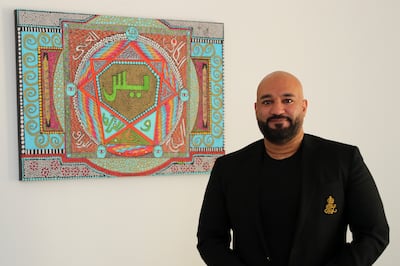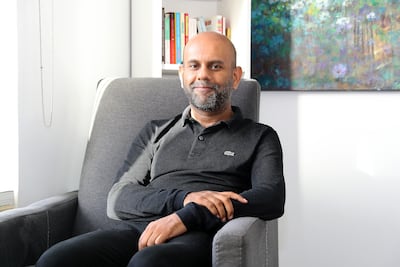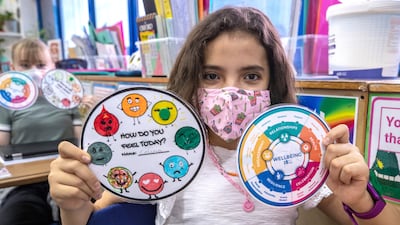Reaching out for mental health support can seem overwhelming.
Marking World Mental Health Day on October 10, The National spoke with several mental health experts in the UAE to show you how and where support can be found and accessed.
The UAE has a number of free helplines and support groups operated by clinics that people can access, many listed below.
“It’s really important for people to know that there is help out there and they shouldn’t suffer in silence,” said Dr Yaseen Aslam, medical director at The Psychiatry and Therapy Centre in Dubai.
the Psychiatry and Therapy Centre, Dubai
“It can be daunting and challenging to take that first step and reach out for help.
“It takes courage but it’s certainly a step worth taking that can result in a number of potential benefits for your health and well-being.”
Finding help can be as simple as logging on to the internet and looking at clinics in your area that offer mental health services.
Most clinics have details of their staff on their websites and some people may choose to make an appointment with a psychologist, therapist or psychiatrist, based on their biography.
How one Abu Dhabi school put mental health as its heart
Carolyn Yaffe, a psychotherapist at Camali Clinic in Dubai, said people could also go to their general practitioner and ask for a reference.
Once someone contacts a clinic they may be faced with a short or long waiting time.
“If something is an emergency, they will come to us and ask us if there is any way that we can fit them in and we'll figure something out,” Ms Yaffe said.
She explained that when a client calls a clinic, they typically have to answer a few questions, such as what kind of service they are looking for.
The first appointment
“It's really important to make sure that the person is at ease because it is very hard to come and see somebody for the very first time … to open up is incredibly difficult,” said Dr Asad Sadiq, a consultant psychiatrist at The Psychiatry and Therapy Centre in Dubai.
He said the first session was critical in terms of not just engagement with the expert but with mental health services in the future.
“That's when you have to give somebody hope and reassure them that they're going to get better and listen to exactly what their problems and expectations are,” he said.
Insurance coverage
One thing that holds many people back from seeking mental health support is lack of health insurance coverage and costs of therapy or treatment, said experts.
Ms Yaffe said administrative staff at clinics are trained to help people check if their insurance provider will cover their mental health treatment.
Some insurance providers may have a network they work with so one can be chosen from a selection of approved clinics.
“Unfortunately, there is still insufficient insurance coverage for mental health difficulties from many of the major providers. However, this is certainly improving,” said Dr Aslam.
“It’s always good to inquire with your insurance provider directly to determine the extent of coverage they will provide for mental health conditions depending upon the terms and conditions of your individual policy.”
Free resources
The UAE has many initiatives for citizens and residents, where people can access mental health services free of charge.
These free helplines are set up by government initiatives and can be used to access mental health support from qualified professionals. These include:
— The Estijaba helpline: 8001717.
This helpline was set up to address psychological distress calls, including emergencies in the community. It is a free-of-cost service available six days a week, from Sunday to Friday between 8am and 6pm.
— The UAE Ministry of Health and Prevention also has a hotline for those seeking help: 045192519
— This is UAE’s Mental health support line — 800 4673 (Hope). More information is available at https://hope.hw.gov.ae
Free online resources can also provide guidance, tools and information on mental issues. These include resources offered by the Mind mental health charity in England and Wales, the Royal College of Psychiatrists in the UK and the NHS, Britain's state-funded health service
People can also consider undergoing online therapy from clinicians in other parts of the world.
“Clinicians in other parts of the world can work from home and don’t have the overhead costs that are involved with working within a clinic so they can keep the costs low,” said Dr Sadiq.

Support groups
Dr Hussain Riaz, consultant psychiatrist at The LightHouse Arabia in Dubai, said the centre has low-cost and free group services both online and in-person.
The LightHouse Arabia has more than 20 support groups for people who are struggling with various life circumstances, such as grief, infertility, a cancer diagnosis, single parenting, expat adjustments, or divorce.
“It is important to say that support groups are not for everyone and if someone is very clinical in their presentation, we would recommend psychiatric and/or psychological care in addition to the support group,” said Dr Riaz.

Roadblocks
Some of the main obstacles people faced were finding someone they felt comfortable with and paying for services.
“Sometimes, we may face hurdles in the form of insurance coverage which is still too limited by many providers for mental health conditions,” said Dr Aslam.
Common misconceptions
“People often fear being prescribed 'mind-altering addictive medications'. However not all medications are addictive.”
Dr Aslam said medication was only prescribed as part of treatment plan devised by an expert psychiatrist and under their supervision.
Dr Riaz said he “would like to reassure everyone that most mental health illnesses do not require you to take medication for lengthy periods of time”.
"Antidepressants used for depression and anxiety are not addictive,” Dr Riaz said.

“Some of the quick-acting drugs can be addictive if used over a long period, but any sensible and competent psychiatrist will not encourage or engage in such practice.”
Although medication was important, Dr Riaz said the aim was for it to enable people to engage in other therapeutic interventions such as therapy and counselling.
He said these therapies help to build resilience and allow you to address any similar challenges you may face in the future.
Finding the right help
Dr Sadiq advised people to find somebody they were comfortable with.
“When that happens, and you feel you can build up trust, then it works out really well.
“The most important thing that's going to get you better is your relationship with the therapist or the psychiatrist.”













